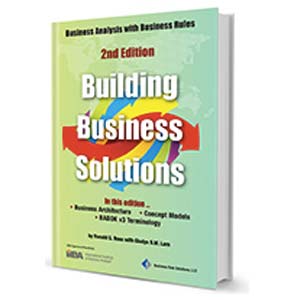SBVR Speaks: (8) Business Definition
In January 2008, the "Semantics of Business Vocabulary and Business Rules" (SBVR) was first presented by the Object Management Group (OMG) as an official specification of the OMG. Version 4 (SBVR 1.4) was published in 2017.[1]
Last time, we looked at some of the supplemental forms that can be used when defining business concepts in a business vocabulary. In this instalment we turn our attention to the central form — a definition that expresses the concept meaning — according to the "Semantics of Business Vocabularies and Business Rules" (SBVR). This part of the SBVR Vocabulary [3] provides concepts and terms for stating the definition of a vocabulary entry, using SBVR Structured English.
Style of Definition
In SBVR, as in ISO[4], a definition can be either an intensional definition or an extensional definition.
intensional definition
An intensional definition is a definition that describes the intension of a concept by stating the superordinate concept and the delimiting characteristics.
extensional definition
An extensional definition is a definition that is a description of a concept by enumerating all of its subordinate concepts under one criterion of subdivision.
Definition Origin
A second way to categorize a definition is by its Definition Origin, which classifies a definition based on whether it is owned by its speech community or adopted by its speech community from an identified source.
owned definition
An owned definition is a definition that a speech community 'owns' and is responsible for creating and maintaining. For example, EU-Rent 'owns' its definition of the concept of barred driver.
adopted definition
An adopted definition is a definition that a speech community adopts from an external source by providing a reference to the definition. For example, EU-Rent adopts definition 2b of 'law' from Merriam-Webster Unabridged, using the terms 'law' (primary) and 'statute' for the concept in the EU-Rent vocabulary.
Note that the primary term used for the concept does not have to be the same as the primary term in the source. For example, EU-Rent has taken the definition of 'law' from MWU and might have preferred to use 'statute' as their primary term for this concept.
Additional Aspects of Definition
In addition to these two categorization schemes for definition, the following aspects involving 'definition' are worth noting:
definition serves as designation
In some (rare) cases, a concept has no term (or other designation[5]). In such a case, the definition of the concept is used as the term for that concept.
designation is implicitly understood
It is possible for a term (or other designation) used by a speech community to have no explicit definition given. This occurs when the term is generally understood by its owning community without needing to refer to a definition.
derivable concept
A derivable concept is a concept whose extension can be determined from its definition or from rules.
References
[1] Semantics of Business Vocabulary and Business Rules (SBVR). Object Management Group.
The current version of SBVR is available on the OMG
site. ![]()
[2] Quick Reference for Basic SBVR Terminology (v. 8)
[3] From Semantics of Business Vocabulary and Business
Rules (SBVR), Subclause 13.1 Definitions & Subclause 20.1 Adoption of Definitions. ![]()
[4] International Organization for Standardization (ISO). Terminology work – Vocabulary – Part 1: Theory and Application, English/French.
(ISO, 2000). ![]()
[5] SBVR defines designation as a "representation of a concept by a sign which denotes it" which comes from ISO. A term is the typical form of verbal designation, but there are also nonverbal designations, such as icons. ![]()
# # #
About our Contributor:
Online Interactive Training Series
In response to a great many requests, Business Rule Solutions now offers at-a-distance learning options. No travel, no backlogs, no hassles. Same great instructors, but with schedules, content and pricing designed to meet the special needs of busy professionals.













